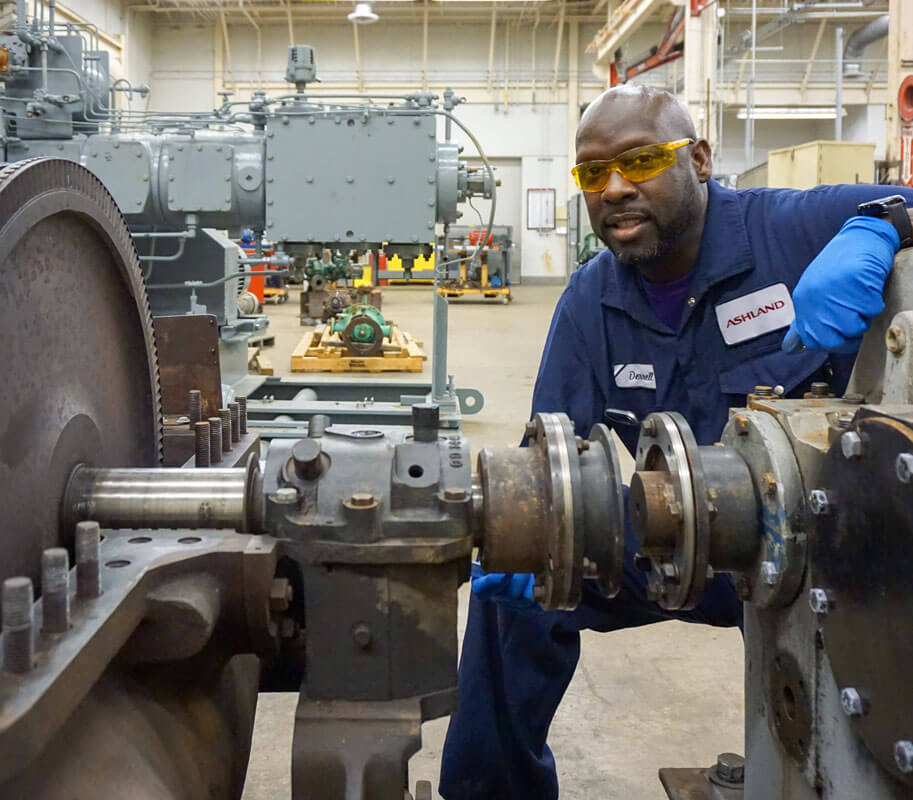
Mechanical Maintenance/Millwright
A Blueprint for Success
A millwright is a skilled worker who manipulates industrial machinery found in factories, construction sites, and other industries. Millwrights are also known as Mechanical Maintenance Technicians.
Millwrights are often involved in comprehensive industrial and mechanical projects due to ever-increasing technology. Basic millwright skills include blueprint reading, installation, maintenance, and repair of industrial machinery and equipment. Using specialized tools, such as welders or hydraulic bolters, they align and replace a machine’s individual parts. They also move and relocate machinery on- and off-site.
Students will earn an Occupational Skills Award (OSA) for each program level to include Mechanical Maintenance/Millwright, Basic, Mechanical Maintenance/Millwright, Intermediate, and Mechanical Maintenance/Millwright Advanced.
Program Details
Learning Format
Face to Face
Program Length
Basic - 37 weeks, Intermediate - 32 weeks, Advanced - 24 weeks
Let’s Connect!
 409-933-8415
409-933-8415 ContEd@com.edu
ContEd@com.edu
Career Insights
Occupational summary for Millwright
53,000 Annual Job Openings
(2023-2033)
15% Projected Growth
(2023-2033)
$63,510 yr Median Salary / $30.53 hr
Additional Program Info
Upon successfully completing the Mechanical Maintenance Technician program, students will earn a Certificate of Completion. Students will gain knowledge from industry professionals and will be able to:
Understand Mechanical Systems – Learn the fundamentals of mechanical power transmission, hydraulics, and pneumatics used in industrial settings.
Perform Preventive and Corrective Maintenance – Inspect, troubleshoot, and repair mechanical equipment to ensure optimal performance.
Read and Interpret Technical Documents – Analyze blueprints, schematics, and equipment manuals for installation and repair.
Work with Industrial Tools and Equipment – Safely operate hand tools, power tools, and precision measuring instruments.
Maintain Bearings, Shafts, and Gears – Install, align, and lubricate rotating equipment components to minimize wear and failure.
Apply Welding and Fabrication Techniques – Use basic welding, cutting, and metal fabrication skills for equipment repair and modification.
Follow Safety and Industry Standards – Adhere to OSHA regulations and workplace safety protocols to prevent hazards.
Troubleshoot Mechanical Failures – Diagnose and resolve issues in industrial machinery, conveyors, pumps, and motors.
- Course name: Introduction to Industrial Maintenance Course Number: INMT-1005
- This course trains students in the basic mechanical skills and repair techniques common to most fields of industrial maintenance. Topics include using precision measuring instruments and the safety rules common in industry.
- Course name: Industrial Mathematics Course Number: TECM-1001
- This course teaches math skills applicable to industrial occupations. It includes fraction and decimal manipulation, measurement, percentages, and problem-solving techniques for equations and ratio/proportion applications.
- Course name: Print Reading for Machine Trades and Rigging Course Number: MCHN-1002
- tudents will study blueprints for machine trades with an emphasis on machine drawings. Topics include identifying the elements of machine drawings; interpreting the dimensions, tolerances, and geometric aspects of blueprints; explaining geometric dimensioning and tolerancing (GD&T) symbols and their meanings; and identifying the safety concerns associated with lifting loads; rigging a load for lifting; performing a safety check before a load is lifted; and identifying the equipment required to make a lift.
- Course name: Metallurgy and Welding Fundamentals Course Number: WLDG-1021
- This course is an introduction to the fundamentals of the equipment used in oxy-fuel and arc welding, including welding, and cutting safety, basic oxy-fuel welding and cutting, basic arc welding process and basic metallurgy.
For information about registration, please contact the Continuing Education Department at ContEd@com.edu or call 409-933-8415.
